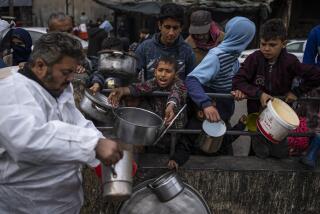Clinton Announces Bosnia Airdrop : Relief: Indications mount that Serbian forces may soon overrun areas designated for aid.
- Share via
WASHINGTON — President Clinton on Thursday announced the beginning of U.S. airdrops to isolated villages in Bosnia-Herzegovina as indications mounted that Serbian forces may be about to overrun many places targeted for the aid.
Having obtained allied support and arranged technical details with the United Nations, Clinton described the airdrop operation as a “temporary measure” meant to “address the immediate needs of isolated areas that cannot be reached at this time by ground.”
Pentagon officials said the order to execute the plan had not yet been issued. But they said they expect the operation to begin soon--perhaps as early as Sunday--and to last only a few days. U.S. cargo planes based at Rhein-Main Air Base in Germany will fly at night and at high altitude to reduce the risk of being hit by ground fire.
A senior official described the airdrop as “a short-term emergency effort” that was “by no means (intended as) a substitution for land convoys.” He stressed that distribution of food and medicine would be “absolutely evenhanded,” without regard to whether the supplies would be used by Serbs, Croats or Muslims.
Meanwhile, Clinton called on the warring factions to stop impeding delivery of supplies on main overland routes, the primary source of food and medicine for the residents of devastated eastern Bosnia.
But Western diplomats in Belgrade reported Thursday that some places in the most dire need of help are on the brink of falling to Serbian fighters.
Despite earlier warnings by Serbian military leaders that the airdrop risked spreading the war, Bosnian Serb commanders issued an order to Serbian forces not to shoot at U.S. aircraft, according to the Belgrade news agency Tanjug.
Belgrade Radio accused Muslim fighters from the eastern Bosnian stronghold of Srebrenica of launching an attack around Bratunac, a town held by Serbs on the Bosnian frontier with Serbia. Another convoy of the Office of the U.N. High Commissioner for Refugees reached Gorazde, a Muslim enclave in eastern Bosnia.
Relief workers returning from the eastern city of Tuzla said they believe Serbian forces are close to seizing control of enclaves containing as many as 200,000 Muslims in eastern Bosnia. They said the strongholds of Cerska, which has been without outside relief since the war began last April, and Srebrenica are particularly vulnerable to Serbian attacks.
They also said that conditions are rapidly deteriorating in Tuzla, the largest of a handful of government strongholds in eastern Bosnia.
At a recent meeting in Tuzla, Bosnian regional commanders broke down in tears when they explained how their strongholds were doomed to fall to Serbian fighters, a Western diplomat said. Serbian forces now control about 70% of Bosnian territory.
The mainly Muslim military leaders insisted that support is essential for Tuzla, which is surrounded by Croatian and Serbian forces. They pleaded for the opening of the city’s airfield for humanitarian relief. “It would provide immediate access for aid to hundreds of thousands of people in one of the most important centers in free Bosnia,” the diplomat said.
Swamped with refugees from so-called “ethnic cleansing” by Bosnian Serb forces, Tuzla authorities are barely managing to feed the burgeoning population. Relief workers estimate energy reserves will last only another six weeks.
U.S. officials said the airdrops will be made by Air Force C-130 Hercules cargo planes, each carrying 16 one-ton pallets of food and medical supplies. Each mission will involve three to five sorties, they said.
U.S. officials said that the C-130s would be protected from the threat of retaliatory attacks by fighters from the carrier Kennedy, which is to be stationed offshore during the operation.
Authorities stressed that the fighters would not actually escort the C-130s during the operation. One official said that the flights would intentionally be both “unescorted and unarmed” to underscore the fact that the mission is strictly a humanitarian one.
The United States has 20 warships in the Mediterranean area that could be used to back up airdrop operations.
Times staff writer Broder reported from Washington and Times special correspondent Silber from Belgrade. Times staff writer Art Pine in Washington contributed to this report.
More to Read
Sign up for Essential California
The most important California stories and recommendations in your inbox every morning.
You may occasionally receive promotional content from the Los Angeles Times.










